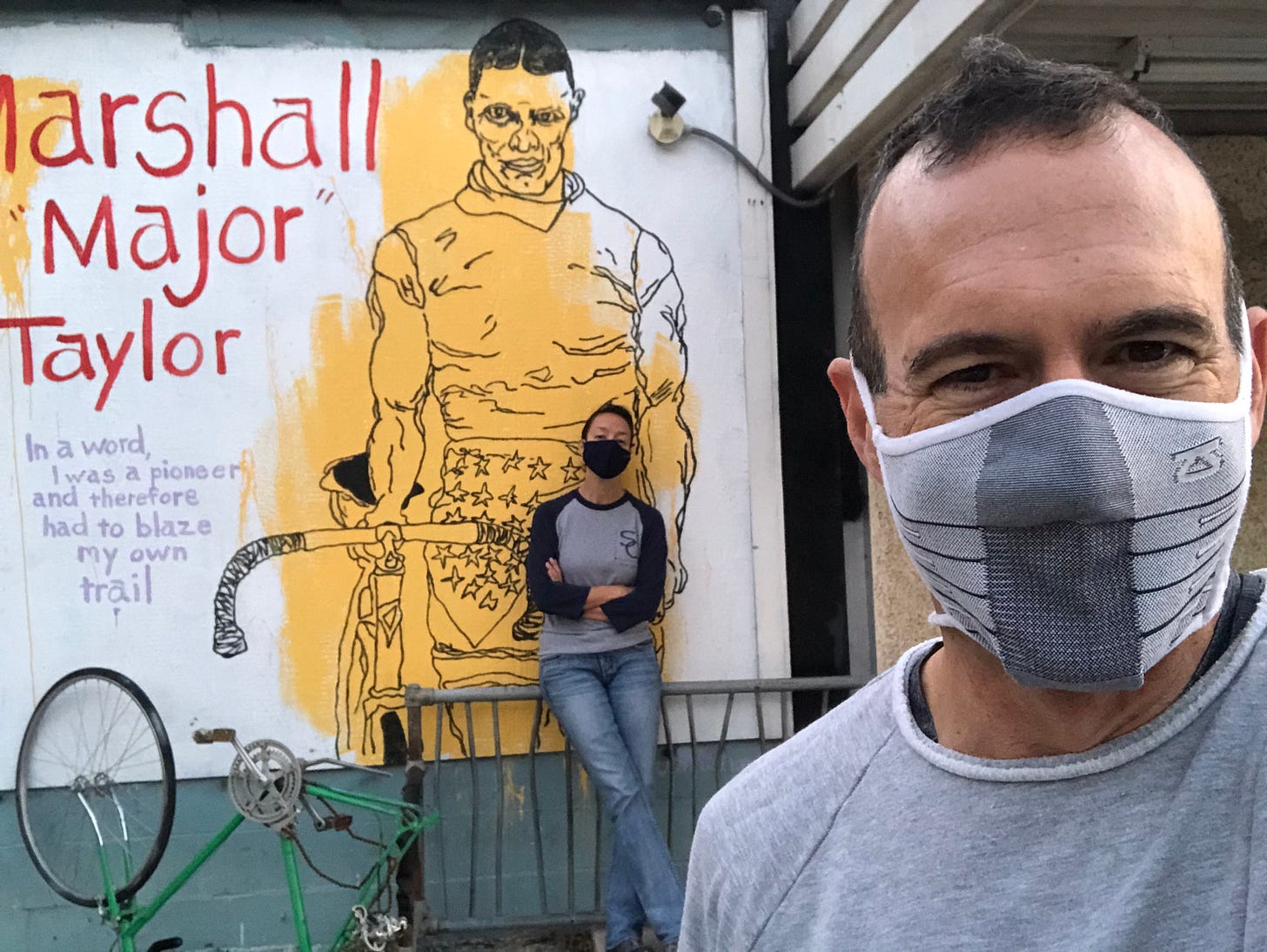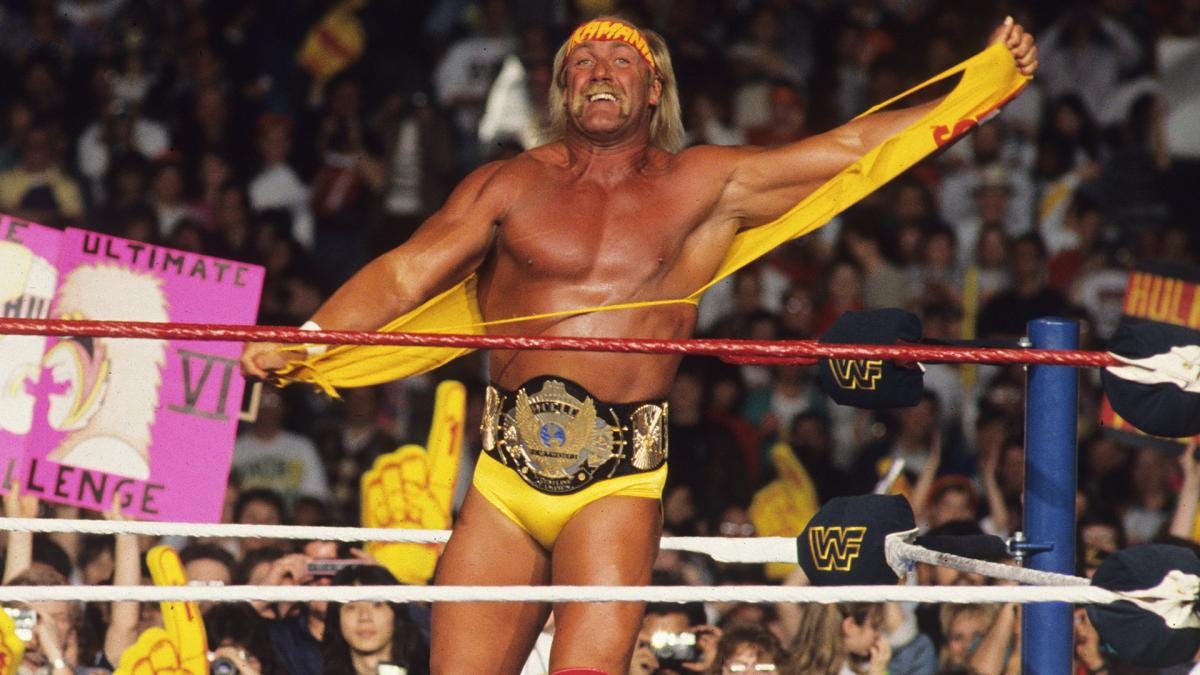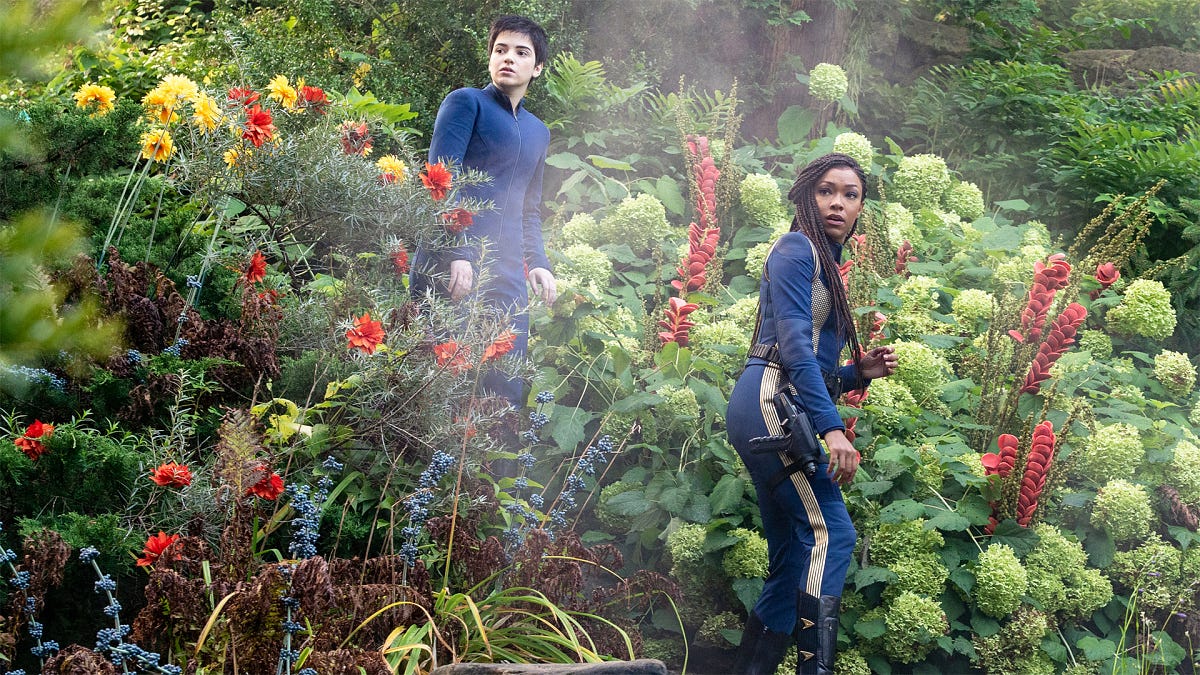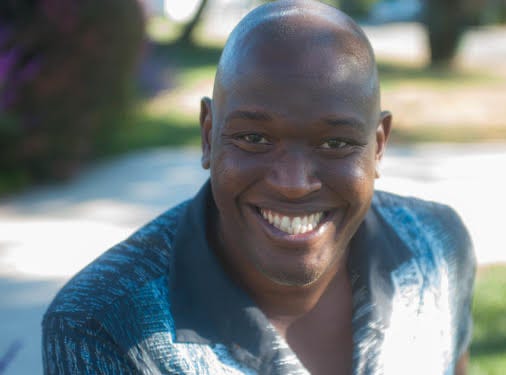Transition
Joe Biden has a transition plan. Do you?
Welcome to The Experiment, the weekly newsletter where we’re making our way through the Uncertain Now. I look at transition plans, yours and Biden’s. Jack Hughes looks ahead to the next election in “Hogan 2024.” Sonia Van Meter cries several times watching the latest episode of Star Trek: Discovery in “Communion.” Dr. Tyrone Grandison, a newcomer to The Experiment, offers “How to Bridge America’s Divide.” And Robin Whetstone ends up in a drug lab in “Upside Down.” Hey, they all can’t be hopepunk explosions.
And as always, we remember who we lost and offer suggestions on what to do (this pork all’arrabbitata), read (a British journalist went to the Four Seasons Landscaping presser), watch (Hugh Laurie plays a scheming British politician), and listen to (my cousin’s new Hawaiian Christmas album).
But first, have I ever told you what I regret most?
One problem I’ve had in life is that I’ve been so busy trying to get somewhere that I never fully appreciated what was happening all around me. While I was trying to build a life, I completely missed how the world was rebuilding itself all around me. Other people figured out in real time that the Internet was going to rewire humanity, and I just thought it was cool that I got to read the newspaper on my laptop. While others figured out that technology enabled them to create music in new ways, I was happy downloading songs from iTunes. I mistook disruptions for diversions and missed wave after wave of world-changing innovations. I Mr. Magoo’d my way through half a century, noticing changes only in retrospect, regretting my lack of real-time awareness.
Then I had a conversation with Scott Remley as the virus spread from China across Europe. We “if-then’d” the scenario to our country and realized what was about to happen to us. I wasn’t in the moment. I was slightly ahead of it, hyper aware of how time was discrete. Instead of an abstraction stretching out to an unknowable end, time was about to become a defined era. A pandemic, with a beginning and an end, was upon us, and we would someday look back and measure that time not just by the number of days but how we filled them. The pandemic for some was a pause button, a “lost year,” an amorphous blob of existence. For me, time became almost tangible.
Don’t get me wrong. My zeal to use my time to my fullest was, in retrospect, fueled by panic. Add to that having a president call the pandemic a hoax, and at least half of the exercise, weight loss, and cooking was due to me wanting to have some control over my environment. But unlike the rest of my life, when resolutions could break harmlessly, even expectedly, and the future stretched with the tease that there would always be more, every day in 2020 came at a price. Whether I paid that price or cashed it in was my choice. So the book got finished. The weight, lost. The newsletter, relaunched.
There was the Before Times. The Uncertain Now would end. We can make plans for the future.
Then, of course, all history happened at once. If you’ve ever wondered what the 1960s would have been like without being allowed to breathe on each other, if you’ve ever watched a zombie apocalypse movie and judged your odds favorably, if you’ve ever read about Weimar Germany and assured yourself that you would not have been complacent about Hitler’s rise, then 2020 was like a choose-your-own adventure game. Living through history sounded like more fun before we found ourselves in the middle of all of it. Remember in April when the Pentagon declassified three UFO videos taken by Navy pilots, and our reaction was, “Yeah, buddy, take a number”?
Last week as Sonia and I walked in the Ozarks, I let myself imagine living in a country where it didn’t feel like an abusive stepfather was yelling at us that it was all our fault, and that awareness of time returned. The temptation to make post-Trump resolutions kept popping into my head. In the span of 48 hours, they called the election for Joe Biden and announced that a vaccine was on its way. By January we would have a new president; by April, a vaccine. “I used to wonder what V-J day felt like,” tweeted a friend. “Now I know.”
There was the Before Times. The Uncertain Now would end. We can make plans for the future. A couple of weeks ago, I was surprised at my reaction to seeing Christmas trees on sale at Costco. They really think we’re going to live that long? Now, I can plan for a book tour and my brother’s wedding in Australia. Heck — and I am actually just realizing this with genuine excitement — I can take my wife out to a restaurant on a real date!
Joe Biden’s making plans, too. First comes the transition, and it appears he’s asking actual grownups to come up with a plan for our generation’s Dunkirk, which will be the global distribution of a coronavirus vaccine. Remember how hard it was to get toilet paper in March? Now imagine that toilet paper could end a plague, and we don’t have enough air cargo capacity to distribute it. It’s going to take all the king’s airlines and all the king’s men to put this planet back together again, but at least this time there’s going to be a plan. He’s promised that on day one, he’ll have a plan to distribute the vaccine.
Biden will be inaugurated in 68 days. Between now and then, 68 days will elapse. He intends to fill those up with a plan to literally save humanity.
In 68 days, when Marine One carries that dime-store despot into the sky to despoil civilization in a more piecemeal fashion, you’ll still be you. Will the only credit to that time be your endurance of it? We’ll get back the headspace he forceably occupied for the last four-plus years. What’s your plan to replace it?
There are 68 days left of Trump. What is your transition plan?
Hogan 2024
by Jack Hughes
Jack Hughes’ back with a look at the buzz about Hogan running for the Republican nomination in 2024.
After showing remarkable resilience in the 2020 campaign, the Republican Party now finds itself at an inflection point. It can go back to the ‘mainstream’ politics of its storied past or go ahead with the ‘main event’ politics of its stormy present. It’s a choice personified by two Hogans.
S3 E4: Communion
by Sonia Van Meter
Season 3 of Star Trek: Discovery is not being subtle with the parallels between what’s happening 900-some years into the future and what’s going on right now. Sonia Van Meter gets into it and pulls out a lesson we all can say grace around.
"One day I’ll get through one of these episodes without crying. But today ain’t it."
How To Bridge America’s Divide
by Dr. Tyrone Grandison
Dr. Tyrone Grandison, the Co-Chair of the Seattle Human Rights Commission and political partner at the Truman National Security Project, has some thoughts about the calls for unity.
“Let’s reach out to the other side” only works when the other side shares the same value in the truth as you do.
Red Ticket: Upside Down
by Robin Whetstone
This weekend in Red Ticket, Robin Whetstone ends up in a drug lab.
Who leaves their drug lab unlocked?
RIP
The creator of the Cotton District in Starkville
This end-times preacher
How we’re getting through it
Making three-cup chicken
Freezing caramelized onions
Understanding the election better
Making super easy braised pork all’arrabbiata
What I’m reading
Nathan Bomey: “Were voters manipulated by QAnon a force behind Trump's 'red wave' in 2020 election?” -
Emilio Ferrara, a professor and research team leader at the USC Information Sciences Institute, said voters in Florida, Georgia, North Carolina, Wisconsin, Michigan, Nevada and Arizona “have engaged and supported” QAnon content at a rate of “about twice” the average state.
Stephanie Butler: “The Story of the Sandwich” - It’s kind of messed up that sandwich is named after the guy who made the vague food order rather the person who invented it.
CJR: “How the press covered the last four years of Trump” - Yo, jornos: read this.
As Trump’s first or only term winds down, this view of journalism has never looked creakier, or more deficient. Journalists in newsrooms across America are assailing the old notion of “objectivity” as morally inadequate: calling Trump a friend of “virulent racists” isn’t invective but a truth that must be told. For his part, Trump has ruthlessly gamed old-school journalists’ commitment to covering “both sides” of the story, winning more than equal time for his lies, as well as “he said, she said” fig leaves for his obscene behavior.
Nate Cohn: “What Went Wrong With Polling? Some Early Theories” - Until we get all the data in, this is what you should read about how the pollsters botched 2020.
“The basic story is that after lockdown, Democrats just started taking surveys, because they were locked at home and didn’t have anything else to do,” said David Shor, a Democratic pollster who worked for the Obama campaign in 2012. “Nearly all of the national polling error can be explained by the post-Covid jump in response rates among Dems,” he said.
FC: “Meet the computer scientist and activist who got Big Tech to stand down: Joy Buolamwini’s research helped persuade Amazon, IBM, and Microsoft to put a hold on facial recognition technology. Through her nonprofit Algorithmic Justice League, she’s now battling AI bias in other realms.” - Went down a rabbit hole on this one
Buolamwini was inspired to investigate algorithmic bias when she found herself donning a white mask to code at MIT’s Media Lab. She was creating a whimsical augmented reality project and the off-the-shelf computer vision technology that she was using had trouble detecting her face. When she put on a white mask, obscuring her features entirely, the computer finally recognized her.
Jill Filipovic: “Epidemics can change our policies; do our policies cause epidemics?” - Every once in a while, a smart writer gets ahold of a book review and says something great
America’s interconnected histories — an authoritarian and discriminatory one in which “legal responses to epidemics have targeted the poor, people at the border, and nonwhites” to exploit and entrench inequality, and a progressive and liberal-minded one that reminds us that “calamity can be an occasion for making intolerable social conditions visible” and then improving them — offer competing paths forward, with one choice emerging as the most obviously beneficial. There is opportunity in tandem with despair, and no nation is doomed to repeat the worst of its history. We can always choose better.
Richard Hall: “I saw Donald Trump’s presidency come crashing down at Four Seasons Total Landscaping” - Oh God, the neighbors are watching.
They say a star burns brightest just before it dies, and this was the Trump presidency in all its flaming glory.
Philip Kennicott: “Trumpism is a lifestyle disease, chronic in America” - I’ve seen two takes from the election that fall into the “we’re saved!” and “yeah, but we still have work to do.” Both are correct, but incomplete. Kennicott, an art and architecture critic, advances the argument. The phrase “must read” gets thrown around a lot. If you like The Experiment, you will love this. It is shoutingly good.
That this week’s election wasn’t a repudiation of Trumpism, that some 6 million more Americans believe in it now compared with four years ago, is horrifying. But it’s also reality, and it’s always best to face reality.
Austin Kleon: “Not everything will be okay (but some things will)” - Austin and I share a loathing for inaccurate aphorisms. This post was a balm.
You know you’re in a bad spot when passing sidewalk chalk platitudes on your daily walk makes you murderous.
For me, yesterday, the breaking point was a hand-painted sign that read “EVERYTHING WILL BE OKAY.”
James Parker: Total Landscaping: A Masque - Funny stuff, as Johnny Carson would say.
But that sulking Caesar, POTUS—where’s he gone?
Is he watching Fox News with a big frown on?
We’ll seize the cycle. We’ll make allegations.
Reverse these numerical humiliations.
A major press conference, that’s the thing.
At the Four Seasons ... Total Landscaping.
R.A. Schuetz: “'No home here': Houston Realtors forced to grapple with racism amid posts about bullets, fire hoses” - Some Houston Realtors think they have a First Amendment right to be racist online without professional repercussions
Kim Barnes, a real estate broker who has served the Houston area for 24 years, was scrolling through Facebook on her phone in May when she saw a message that stopped her in her tracks.
“I think black people bring out the worst in us,” said the post by a Houston real estate agent.
Emily Yahr: “Read what Dave Chappelle said in his SNL monologue about Trump and the election” - Now we can go back to being upset at comedians for telling jokes that make us angry!
“Now Trump is gone. I know a lot of people don’t like him, but I thought the guy was at least an optimist. I am not as optimistic as he was. I look at it, like, well there’s bad people on both sides."
What I’m watching
My buddy Phil suggested this David Attenborough documentary about how to save the planet.
Stephen Colbert telling the story about how he met his wife is charming as heck.
But our featured thing to watch this week is Roadkill, the entertaining Hugh Laurie vehicle on BBC. It’s low-stakes British political fun absent all manner of public trauma, kindergarten coups, and orange leviathans. You can watch it on the PBS app.
What I’m listening to
Nané, an indie R&B band out of Austin, is out with a new eponymous album. For some reason, this song, “Quaranteen,” isn’t on it.
“Can't Go For That ft. Ty Dolla $ign, Lil Duval,” by 2 Chainz, Atlanta’s party rapper, is eminently listenable. Don’t let it breathe on you. It’s catchy.
I hate Christmas music. Loathe it, even. But my brilliant cousin Isaac plays steel guitar in Slowey & the Boats, a Philadelphia-based Hawaiian music band, because obviously. They just dropped a holiday album, “Merry Christmas from Slowey & the Boats, Volumes 1 & 2.” Turn this on, close your eyes, and imagine you’re being charming at a swank Christmas party. I guess I don’t hate all Christmas music. I love this.
What do you think of today's email? I'd love to hear your thoughts, questions and feedback. I might even put ‘em in the newsletter if I don’t steal it outright.
Enjoying this newsletter? Forward to a friend! They can sign up here. Unless of course you were forwarded this email, in which case you should…
Forget the Alamo: The Rise and Fall of the American Myth by Bryan Burrough, Chris Tomlinson, and myself comes out June 8 from Penguin Random House. There is no better way to support this book than to pre-order a copy. You’re going to love reading what really happened at the Alamo, why the heroic myth was created, and the real story behind the headlines about how we’re all still fighting about it today.
Thanks to Noom I am down to my college weight, and haven’t had to cut out any foods. I hit my goal weight before Memorial Day and have stayed within a few pounds either way ever since. This is easy. Noom is an app that uses psychology, calorie counting, and measuring activity to change your behavior and the way you think about food. I’m stronger and healthier than I’ve been in years. Click on the blue box to get 20% off. Seriously, this works.
Headspace is a meditation app. I’ve used it for a couple years and am absolutely shocked at how much it’s taught me about managing my inner life. Try it free for a couple weeks. Don’t worry if you’ve never done it before. They talk you through it.
I now offer personal career coaching sessions through Need Hop.
If this newsletter is of some value to you, consider donating. Honestly, I’m not doing this for the money. I’m writing this newsletter for myself, and for you. And a lot of you are contributing with letters and by suggesting articles for me to post. But some of you have asked for a way to donate money, so I’m posting my Venmo and PayPal information here. I promise to waste every cent you give me on having fun, because writing this newsletter for you is some of the most fun I’ve had. Venmo me at @Jason-Stanford-1, or use this PayPal link.







